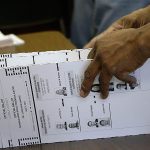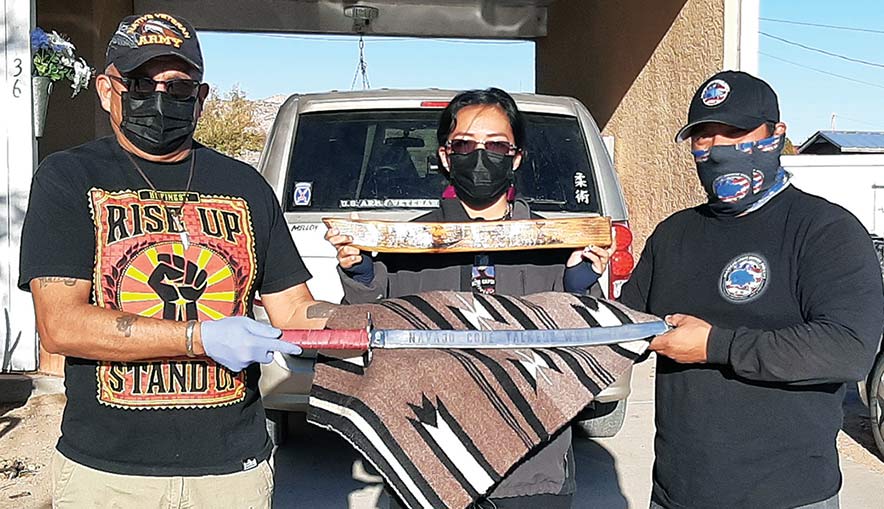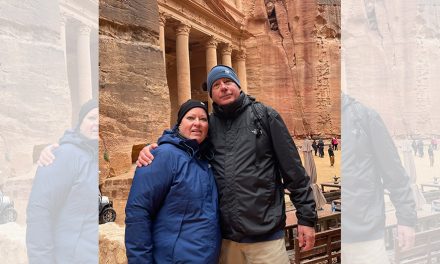
Bladesmith honors code talker: Presents one-of-a-kind sword to Navajo-Hopi Honor Riders

Courtesy photo
Michael Mitchell and his daughter Amy Mitchell present the Navajo Code Talkers Katana sword to Navajo-Hopi Honor Riders President Bobby Martin at their home and workshop in Tohatchi.
WINDOW ROCK
Last summer Tohatchi veteran Michael “Mike” Mitchell was inspired by the news that Arizona made Aug. 14, national Navajo Code Talkers Day, an annual state holiday that honors the code talkers’ service, sacrifices and dedication to the protection of the Nation.
At that time, Gov. Doug Ducey proclaimed that the code talkers’ “bravery and ingenuity” were instrumental in helping the Allied Forces claim victory in World War II.
“Their unbreakable code assisted the U.S. Marines in numerous missions, including the Battle of Iwo Jima (1945) …,” said Ducey. “Please join me in celebrating the work of these patriots and recognizing our surviving code talkers.”
In turn, Mitchell, a Diné bladesmith, silversmith and blacksmith, decided to create something special to help carry on the legacy of the Navajo Code Talkers.
He chose to make a Japanese style Katana sword dedicated to them, which had never been done before.
“I wanted to do something different,” said Mitchell. “I’m an Army vet so this is how I would make this tribute to them.”
Katana swords are known for their signature single-edge, curved blade and long handle for a two-handed grip.
Historically, Katana were used by Japanese Samurai warriors in the battlefield and are still used in martial arts training to this day. They are considered symbols of authority and spirituality and revered not only as weapons but also as works of art.
Mitchell said that in the process of making the sword, he learned that each part of the Katana has a purpose.
A Diné touch
“It’s interesting how the sword is used in many ways,” he said. “The Japanese, when they make their swords, use sharkskin or sting rays for the handle wraps. I wanted mine to be more traditional Navajo.”
So, Mitchell used deer hide leather to wrap the handle and embellished it with silver and a Kingman turquoise stone and etched Native American emblems.
The 30-inch blade is made out of high carbon steel. One side of the blade has “Semper Fi U.S. Marines Unbroken” etched into it and the other side says, “Navajo Code Talkers WWII 1942.”
“I made it my version of the Katana,” he said. “It’s not a replica.”
The sheath, or cover, for the sword is made out of cedar wood that Mitchell’s daughter, Amy Mitchell, 19, painted with classic images of the Navajo Code Talkers.
“She’s an artist and she does it by hand,” he said.
Amy, who is also a fiber artist and weaver, said she felt good about working on the sword project with her father.
“I thought it was an interesting experience because in order to do the artwork, you need to have a basic background of what happened,” she said. “I had to read up on events, especially ones that were depicted in images.
“I think I got a powerful learning experience because the code talkers are such prominent figures and their accomplishments and discipline inspired me in other parts of my life,” she added.
Amy is pursuing a nursing degree at the University of New Mexico and plans to join the military.
“I try to keep busy,” she said.
Mitchell said he’s taught all four of his children how to make their own knives.
“I enjoy what I do,” he said. “It’s like therapy. You get lost in what you’re doing because you turn a piece of steel into something. I like that.”
Entrusted to Honor Riders
In the spirit of keeping the code talkers’ legacy alive, last Wednesday, Mitchell donated his sword and entrusted its stewardship to the Navajo-Hopi Honor Riders, a nonprofit biker group that honors and supports military families by offering escort services for funerals and welcome-home events.
“They honor the Navajo Code Talkers and veterans,” said Mitchell. “I said I want to donate a code talkers sword to you guys.”
NHHR President Bobby Martin said he was deeply honored and humbled to meet Mitchell and receive the sword.
“What he presented us with is nothing short of amazing,” he said. “My words fall short. He just said he was really appreciative of what we do. I never expected anything like this.”
Martin said the quality of workmanship and level of detail that went into making the sword was “mind-blowing” and the donation from Mitchell was a complete surprise.
“We, as Navajo-Hopi Honor Riders, never ask for fees or payment or recognition,” he said. “All these rides and escorts that we do, we do it because it’s what compels us from our heart to do for our veterans.”
The first NHHR escort ride was organized 19 years ago for Martin’s cousin, U.S. Army Spec. Lori Ann Piestewa, Hopi, who was killed in the line of duty on the front lines of the Iraq War in 2003.
“I still carry that day with me today,” Martin said. “We’re in our nineteenth year of doing what we do. We never expected it to go this long…”
Martin said in the past week alone, the NHHR received eight requests for escorts.
“Right now, everyone’s just saying, yes, please continue what you’re doing,” he said. “It’s amazing how many people want NHHR to be part of these escorts for their family members.”
The NHHR also participates in community service projects, helps veterans with home improvement and building projects, organizes food distributions and toy drives during the holidays, and raises awareness about issues affecting Native military veterans or their surviving family members.
“Year round we’re either doing the escorts or helping doing things in our communities across the entire Navajo Nation and Hopi as well,” said Martin. “We do what we can to help when and where we can.”
Through their work, the NHHR provides comfort and compassion to Gold Star Families who have lost a loved one and Blue Star families who have family members currently serving in the military. They also hold an annual honor ride to honor Native Americans past and present.
Thanks for service
“We, as Navajo-Hopi Honor Riders, really thank our veterans for what they’ve done, what they’ve endured,” said Martin. “Every time we see a veteran, we go out of our way to tell them thank you for your service. We know there were a lot of veterans that were never given that recognition.”
While members of NHHR are all volunteers, several of whom are veterans themselves, they raise funds for events to support their services.
Other biker organizations, such as the Patriot Guard Riders and Nation of Patriots, are among their major donors.
Martin said that from now on the honor riders will proudly carry Mike Mitchell’s Navajo Code Talkers sword with them to special events.
“If we do events for Navajo Code Talkers, we will definitely have this there to show,” he said.
Martin said Mitchell and his daughter Amy are invited to the next NHHR board meeting so that all of the honor riders can meet the people who made the one-of-a-kind Navajo Code Talkers sword.
Mitchell said that his hope is simply that the code talkers never be forgotten and that the sword will serve as one more way to remember them.
“Hopefully the remaining code talkers get to see it,” said Mitchell. “It’s for them and their legacy. I’m proud to have made that.
“From our family to them and all of the veterans past and present,” he said, “I thank them all.”
Information: www.navajohopihonorriders.com








 Highway 264,
Highway 264, I-40, WB @ Winslow
I-40, WB @ Winslow